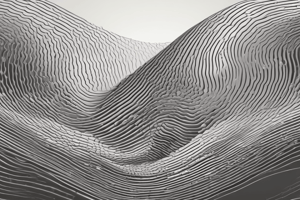Podcast
Questions and Answers
What happens to sound waves during constructive interference?
What happens to sound waves during constructive interference?
- They become completely inaudible.
- They add up to form regions of very high waves. (correct)
- They cancel each other out through phase opposition.
- They experience diminished amplitude.
How is sound intensity defined?
How is sound intensity defined?
- The power per unit area carried by a sound wave. (correct)
- The total energy of the sound wave.
- The range of frequencies heard by the human ear.
- The amplitude of the sound wave oscillations.
Which of the following correctly describes the relationship between pitch and frequency?
Which of the following correctly describes the relationship between pitch and frequency?
- Higher pitch corresponds to lower frequency waves.
- Lower pitch corresponds to higher frequency waves.
- Higher pitch corresponds to higher frequency waves. (correct)
- Pitch is independent of frequency changes.
What differentiates timbre from pitch and loudness in sound waves?
What differentiates timbre from pitch and loudness in sound waves?
Which statement is true regarding the logarithmic scale used for sound levels?
Which statement is true regarding the logarithmic scale used for sound levels?
Which of the following materials can transmit sound waves?
Which of the following materials can transmit sound waves?
What happens during the process of compression in a sound wave?
What happens during the process of compression in a sound wave?
How does the motion of particles in a longitudinal wave relate to the direction of energy transport?
How does the motion of particles in a longitudinal wave relate to the direction of energy transport?
Which formula determines the speed of sound?
Which formula determines the speed of sound?
What is the relationship between the density of a medium and the speed of sound?
What is the relationship between the density of a medium and the speed of sound?
Which wave type is correctly matched with its source movement?
Which wave type is correctly matched with its source movement?
What defines the term 'amplitude' in sound waves?
What defines the term 'amplitude' in sound waves?
What is characteristic of spherical waves?
What is characteristic of spherical waves?
What characterizes a spherical wave?
What characterizes a spherical wave?
In which application are spherical waves NOT typically used?
In which application are spherical waves NOT typically used?
What is the difference between an echo and a reverberation?
What is the difference between an echo and a reverberation?
What factors influence the amount of diffraction experienced by sound waves?
What factors influence the amount of diffraction experienced by sound waves?
What occurs during the refraction of sound waves?
What occurs during the refraction of sound waves?
How do shorter wavelengths affect sound wave propagation?
How do shorter wavelengths affect sound wave propagation?
What happens when two waves meet and interfere with each other?
What happens when two waves meet and interfere with each other?
Which condition is necessary for significant diffraction to occur?
Which condition is necessary for significant diffraction to occur?
Flashcards
What are sound waves?
What are sound waves?
Sound waves, like ripples in a pond, travel by compressing and expanding the air particles.
What is a compression?
What is a compression?
A compression of molecules in a medium, making it denser.
What is a rarefaction?
What is a rarefaction?
A rarefaction is a region where the molecules are spaced farther apart, making it less dense.
What is a longitudinal wave?
What is a longitudinal wave?
Signup and view all the flashcards
What is wavelength?
What is wavelength?
Signup and view all the flashcards
What is amplitude?
What is amplitude?
Signup and view all the flashcards
What is time period?
What is time period?
Signup and view all the flashcards
What is frequency?
What is frequency?
Signup and view all the flashcards
Sound Intensity
Sound Intensity
Signup and view all the flashcards
Pitch
Pitch
Signup and view all the flashcards
Loudness
Loudness
Signup and view all the flashcards
Timbre
Timbre
Signup and view all the flashcards
Interference
Interference
Signup and view all the flashcards
Spherical Waves
Spherical Waves
Signup and view all the flashcards
Coherence (in waves)
Coherence (in waves)
Signup and view all the flashcards
Reflection & Transmission of Waves
Reflection & Transmission of Waves
Signup and view all the flashcards
Reverberation
Reverberation
Signup and view all the flashcards
Diffraction of Sound Waves
Diffraction of Sound Waves
Signup and view all the flashcards
Wavelength and Diffraction
Wavelength and Diffraction
Signup and view all the flashcards
Refraction of Sound Waves
Refraction of Sound Waves
Signup and view all the flashcards
Wave Interference
Wave Interference
Signup and view all the flashcards
Study Notes
Sound Waves
- Sound waves travel through various mediums like air, water, wood, and biological tissue.
- Sound waves require a medium for transmission; they cannot travel in a vacuum.
- Sound waves are longitudinal waves, meaning their vibrations are parallel to the direction of energy propagation.
- Sound waves are composed of compression and rarefaction patterns.
- Compression occurs when molecules are densely packed together.
- Rarefaction occurs when molecules are spaced apart.
Types of Waves
-
Longitudinal waves: Particle movement is parallel to the wave's direction of travel.
- Example: Sound waves in air or fluids. The particles in the medium vibrate back and forth in the same direction the wave is traveling
-
Transverse waves: Particle movement is perpendicular to the wave's direction of travel.
- Example: Waves on a string or water waves
Speed of Sound
- The speed of sound depends on the medium.
- Denser mediums typically transmit sound faster.
- A sound wave traveling 700 meters in 2 seconds has a speed of 350 m/s.
- The speed of sound in dry air at 20°C is approximately 343 m/s.
Sound Intensity
- Sound intensity is the power per unit area carried by a sound wave
- Measuring sound intensity uses a logarithmic scale called decibels (dB).
- More intense sound corresponds to a larger amplitude of oscillations.
- Louder sounds usually have larger amplitudes, while quiet sounds have less amplitude.
Pitch
- Pitch is a subjective measure of how high or low a sound is perceived to be.
- Pitch relates to the frequency of the sound wave
- Higher-frequency sound waves are perceived as higher-pitched
- Lower-frequency sound waves are perceived as lower-pitched
Quality/Timbre
- Timbre distinguishes sounds that have the same pitch and loudness.
- The quality of a sound depends on the shape of the sound wave's waveform.
- Different waveforms for instruments playing the same note give the characteristic sounds of instruments
Interference
- When two or more waves overlap, they combine to produce an interference pattern.
- Constructive interference increases amplitude when waves are in phase.
- Destructive interference deceases amplitude when waves are out of phase.
Reflection
- When a sound wave hits a surface, some of the wave bounces off, called reflection.
Refraction
- When a sound wave passes into another material, the speed and direction of the wave can change due to refraction.
- The change of speed is dependent on the properties of the mediums involved.
Diffraction
- Diffraction occurs when sound waves spread out as they pass through an opening or around obstacles.
- The amount of diffraction depends on the wavelength of the sound wave and the size of the opening or obstacle.
Spherical Waves
- Spherical waves are waves that spread out from a point source, like a loudspeaker.
- Spherical waves exhibit symmetry and strength which diminishes with increasing distance from the source.
- They can also be coherent when the waves maintain a consistent phase relationship, producing interference patterns.
Applications of Spherical Waves
- Used to model sound fields, light propagation, and detection of objects using sonar and radar techniques.
Studying That Suits You
Use AI to generate personalized quizzes and flashcards to suit your learning preferences.




